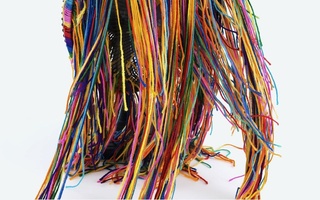I’m walking out of my last class of the day when it happens. Despite the fact that I have already heard it so many times, even here at Harvard, my jaw clenches and I take an involuntary intake of breath.
“Yeah, he was acting so retarded,” she laughs to her friend as they saunter out of the lecture hall.
I was guilty of it too once. Before I spent my summer as a camp counselor for kids with special needs, I would casually use the R-word as well. I’d throw it needlessly and about anything, just as I’ve heard it being thrown around here at school in the past few weeks.
However, after having had the pleasure of getting to know these kids for nine incredible weeks, I can’t hear the word without feeling sick.
I want to chase my classmate down and show her the pictures of the kids I worked with this summer at camp. I want to her to see the girl who was born with cerebral palsy, climbing to the top of the adventure tower all on her own, and describe to her the way—she beamed for the rest of the day afterwards.
I want her to meet the girl who has Down’s syndrome and loved to dance to R. Kelly’s “World’s Greatest.” I want her to listen to the girl who has an inoperable brain tumor that has limited her to a stroller and few motor skills, but who still got on stage to sing The Climb in front of 200 people this summer, flawlessly.
It breaks my heart to think that anyone, much less my own peers at school, would look at these exceptional kids like they are anything less.
What I want most is to show this girl the individuals, the precious human lives, that she is minimizing and degrading by flippantly using this word. While I know this girl meant no harm in her casual statement, any sort of usage of the word propels and enlarges a negative connotation to the entire special needs community.
The thing that is so much more shocking to me is that it is not just this girl that uses the word. I have heard the R-word being used here at Harvard countless times in the past few weeks. I’ve heard it being used in all different ways and all different contexts, from people of all genders, races, and ages.
How is it possible that at for a school so focused on being politically correct, we are so behind the times when it comes to addressing the stigma associated with special needs? Why is it okay to casually use a word that hurts so deeply without a second thought?
I implore the Harvard community to think twice before using the R-word anymore. Advocacy and activism for and by disadvantaged groups have long been parts of the Harvard experience, and it’s time that we extend the same support to those around us living with special needs. Isn’t it time that we pledge to lead the charge in creating a world where youth and adults with special needs no longer have to encounter the questioning stares and insensitive slurs of those that have not taken the time to understand?
As one of the kids at my camp said this summer, “My condition is not a disability. It is a miracle.”
Harvard, it’s time we start acting like it. Let’s spread the word to end the word, which can only happen if we choose to hold each other accountable. If you hear someone say it, kindly ask them to consider choosing a different word. If we refuse to sit back and allow this ugly word to run rampant any longer, we can work towards creating an environment that really does celebrate the qualities that set us apart.
On a campus that sometimes falls short of our respectful and inclusive ideals, I’m calling for a simple but powerful change: Use a different word.
Jillian D. Dukes ’17, a Crimson sports editor, lives in Leverett House.
Read more in Opinion
Ideology Versus Foreign PolicyRecommended Articles
-
He, She, and TheyOften, a writer will reach a grammatical road-block when…the writer…reaches a point in a sentence in which…the writer… has to use a pronoun to identify an individual whose gender is not specified.
-
A Letter to Harvard SeniorsYou may think your relationship with Harvard is over now but, really, it’s just beginning – and not only because the Alumni Association can always find you.
-
In And Around Language: "Hack"Although “hack” was not intended to have a negative connotation, it has often referred to those who used technology for malicious purposes; specifically, by gaining unauthorized access to certain computers and online information. However this wasn’t always the case, or the original intention of the word.
-
 Cassandra E. Euphrat Weston
Cassandra E. Euphrat Weston -
 Liars Create a Dazzling “Mess” of Color
Liars Create a Dazzling “Mess” of Color -
An Interview with Herbie HancockSettled in an armchair and mutely dressed in a grey fleece half-zip and black jeans, Herbert “Herbie” J. Hancock, the 2014 Charles Eliot Norton Professor of Poetry, exuded pure calmness. The legendary jazz pianist, known for leading fearless, searching electric and acoustic projects (Head Hunters, Mwandishi, his Trio) as well as his tenure with Miles Davis’s seminal “Second Great Quintet” in the ’60s, was charmingly low-key but coolly energetic. Hancock, who turns 75 next month, showed absolutely no sign of his age, save for when he stood up and a slight paunch quietly emerged.













